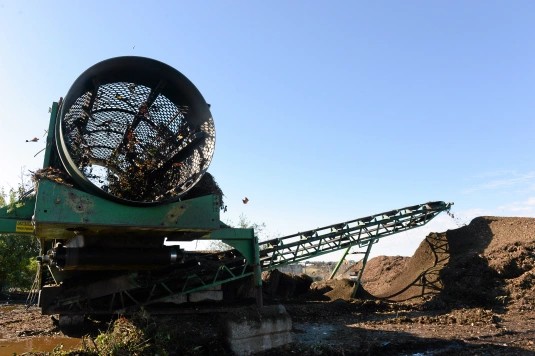
How do we deal with pollution and climate change? Not easily, and not without disrupting how we collect and manage our waste.
The California legislature authored SB 1383, which was adopted in 2016 and implemented in January 2022. A statewide mandate to fight climate change, SB 1383 regulations pose new challenges to not only landfills and recycling facilities across California, but also to local governments responsible for managing solid waste.
With the passage of California’s SB 1383 organic waste diversion law, by 2025 Butte County must divert 75% of organic wastes from landfill disposal at the Neal Road Recycling and Waste Facility.
“We understand the motivation, which is to reduce greenhouse gasses and global warming, but the challenges are huge,” says Deputy Director Craig Cissell, who oversees Butte County’s solid waste disposal, management, and landfill operations.
Butte County is developing a transload facility at the Neal Road Recycling and Waste Facility to receive, remove and transport mixed organic waste for composting by 2023. Mixed organic waste consists of yard trimmings, leaves, and brush that are typically collected from residential green waste collection bins.
Now add food waste to that mix. State law will soon require the mandatory collection of food waste mixed with yard waste. According to Cissell, Butte County does not have a nearby compost facility that can process food waste mixed with green waste. Solid waste planners also face challenges in how they implement the residential collection of food waste mixed with green waste.
“We understand the motivation, which is to reduce greenhouse gasses and global warming, but the challenges are huge.”
Deputy Director Craig Cissell
Butte County Public Works
“Food waste is considered putrescible, which by definition requires more environmental and public health protections,” says Cissell. “We cannot compost food waste that is contaminated with plastic or Styrofoam packaging.”
And by definition, putrescible food waste must be collected weekly.
Organic waste is the largest waste stream in California. Landfilled organic waste emits methane gas/natural gas, pollutants more impactful than CO2, according to CalRecycle’s report.
Under SB 1383, Californians must remove organic material from the waste stream, and convert that waste into compost and soil amendments. The nearest facility capable of producing compost from mixed organic waste is located in Yuba County, more than 60 miles away.
“I have been working on municipal waste and recycling programs for almost 30 years and SB 1383 is one of the most comprehensive and onerous regulations I have seen,” says Natural Resources Manager Linda Herman, who oversees solid waste and recycling programs in the Public Works Department at the City of Chico.
“Implementing food waste recycling in multifamily complexes is also going to be challenging, especially in a college town where tenants change frequently,” says Herman. “Having enough space for additional food waste recycling containers is also a problem for businesses and multifamily properties.”
“California’s SB 1383 disrupts how we collect our waste and how we manage it,” says Cissell. “Projected cost impacts to rate payers are substantial, especially since we’ll need to rely on other out-of-area facilities for solutions.”
The Neal Road Recycling and Waste Facility is owned and operated by the County of Butte and is located at 1023 Neal Road, Paradise, CA. For more information, visit www.recyclebutte.net

